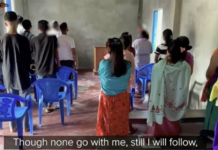ALBUQUERQUE, NEW MEXICO (ANS)–There’s lots of talk of health during this COVID-19 crisis. We need to keep our body, mind, and soul healthy during this time. Cultivating a strong Christian life is akin to training the body for a run (see Hebrews 12:1-2). To help facilitate an exercise plan that is useful for building your spiritual life, we encourage you to follow these three simple steps, taking a LAP around Pastor Skip’s teaching:
Listen to the main points and thoughts shared by Pastor Skip in the teaching. “God and the Coronavirus” is found here.
Answer the questions based upon the message, helping you take the thoughts captive to the obedience of Christ (2 Corinthians 10:5). Questions are found below.
Pray. We’ve offered prayer points based upon the above listening and answers sections.
In this article, Pastor Skip teaches on “God the Coronavirus”
Listen
Recently, there’s not a day that goes by where we don’t hear certain phrases: “Strange days,” “weird times,” and other similar phrases. We’re all in a daze. Furthermore, we’re hearing public service ditties about hygiene and how to keep healthy broadcast around the globe. Even media personalities are adding to the tenure of our times: Musicians are performing live from home, and Bob Dylan released a seventeen-minute song about the death of JFK called “Murder Most Foul” (presumably as a parallel to these world-changing times).
Why all this talk? It’s because this virus is just further evidence of the fallen world we live in. This is not the world God originally intended before the fall. Since the fall, “the whole creation groans and labors” (Romans 8:22). We’re in the middle of a labor pain, so to speak, that points to the broken nature of this world.
 Clinging to God
Clinging to God
My hope is that this current crisis moves us from acknowledging God and believing in God to clinging to God.
During another crisis, a famine in the 1600s, a German pastor named Martin Rinkart was the only pastor left in his town. He was doing up to fifty funerals in a day. But he wrote a hymn that is still sung today, “Now Thank We All Our God with Hearts and Hands.” In the midst of the famine and fear, Rinkart exercised his faith in God, thanking and praising Him. He understood that God is still in control; Rinkart clung to God.
With His Feet Up
God runs the universe with His feet up. Under His sovereign hand, nothing happens by chance or accident. As Daniel reminds us: “The Most High rules in the kingdom of men” (Daniel 4:17, repeated in verse 25 and 5:21). God holds our “breath in His hand and owns all [our] ways” (v. 23). In Luke 12:22-34, Jesus famously told His disciples, “Do not worry” (v. 22) and spoke of God’s care for them if they would put Him first. Then, in Luke 13:1-5, Jesus mentioned two disasters well-known to his audience as a way of establishing that people going through crisis aren’t greater sinners than people who were unaffected.
Equal Footing Before God
My point is twofold: first, that we are all on equal footing before God as sinners in need of a Savior; and second, that those who belong to Christ have His promise to care for them in all situations.
When a situation like COVID-19 occurs, questions run through my mind:
- What is happening? What is the current state of things?
- How am I to think and feel during times like this?
- Why does God allow something so small to stop everyone in the world?
- What now? What am I supposed to do under these circumstances?
Using these points, let’s drill down on the same questions.
What?
What is happening? We know we’re in global pandemic, with 203 countries and territories affected with over 850,000 cases. Both federal and local government officials have told us to stay apart, wash our hands, and cough into our elbows. Our behaviors affect the numbers of those infected. Officials predict that between 100,000-240,000 people will die because of the virus, with a peak in cases around mid-April.
As White House coronavirus coordinator Dr. Deborah Birx states, “There is no magic bullet; there is no magic vaccine or therapy. It’s just behaviors…translating into something that changes the course of this viral pandemic over the next 30 days.”[1]
So, what are we to do? For now, we keep quarantined, up to another thirty days.
As I’ve mentioned before, this is akin to a Leviticus 13 situation (quarantine) tempered by a Romans 13 oversight (government). We need a 1 Corinthians 13 attitude (love).
Yes, it’s a sacrifice—no large Easter celebration for the first time ever?—but it is worth it. As one person put it, “Some things must be that other things might be.” I’m hoping we’ll be able to look back and say, “Whew! Glad we did that.”
But echoing Joseph, we must always remember, what was meant for evil, “God meant for good…to save many” (Genesis 50:20).
 Why?
Why?
So, why does God allow the coronavirus—or any virus, or natural evil, for that matter?
We don’t need to be afraid to ask the question. Jesus asked a similar question to His Heavenly Father (Matthew 27:46). But Jesus leaned into His suffering and used it as an opportunity to save many.
Asking why is understandable.
In philosophy, the coronavirus would be called a natural evil, something that is not evil unto itself, but has evil repercussions. As an example, a tornado is beautiful, but can wreak havoc. Even viruses under the telescope can be beautiful to behold but have dangerous outcomes.
It’s true God has used pestilence and plagues to fulfill His will. As Joel Rosenberg points out, these types of occurrences are found roughly 127 times in the Bible.[2]
Jesus Himself states that there will be famines, pestilence, and earthquakes during the end times, all of which are natural phenomena that have evil consequences (Matthew 24:7).
But in these situations, divine use of these was for one of the following:
- Divine judgment for chronic, unrepentant sin
- To warn other nations they too could face judgement for chronic, unrepentant sin
- A wake-up call to shake individuals and nations from spiritual slumber or rebellion
We don’t know why God is allowing this crisis at this time, but we do know that He is allowing it. If it’s wake-up call, then we need to answer the phone!
I don’t know the why’s, but I pray that God uses our questions as an opening. In dire obstacles come divine opportunities.
How?
The immediate question Christians should be asking is how should we think, feel, and act in this crisis?
In a word, Christians should be content.
As the apostle Paul writes in Philippians 4:11-13, “I have learned in whatever state I am, to be content…. Everywhere and in all things I have learned both to be full and to be hungry, both to abound and to suffer need. I can do all things through Christ who strengthens me.”
Here are some truths to tether us in times of trial:
- Contentment is a learned quality: It doesn’t come naturally, like complaining does, so we must learn to be content.
- Contentment doesn’t depend on quantity: It’s not a matter of creature comforts but of trusting God when you’re full or hungry, happy or sad, flush with cash or strapped.
- Contentment is directly proportional to God relationally: Notice Paul’s phrase, “through Christ.” The Amplified Bible puts it like this: “I am self-sufficient in Christ’s sufficiency” (v. 13, AMP).
Ask yourself: Is Jesus just an important part of your life, or is He the center of it? If He’s the center, then contentment is key.
What Now?
Now is the time for the church to be God’s hands and feet, serving (within restrictions), praying, and ministering.
I can’t fully answer the question of “now what?’, because it’s not fully answerable. Only God knows the full extent of what will happen.
However, this could be the finest hour for the church.
Think of what Christians are already doing:
- Francis Collins, a Christian, is assisting the fight against the virus.
- Samaritan’s Purse is on the front lines in Italy and New York.
- Closer to home, our Kindness Campaign is delivering supplies to needy folks.
Remember: God can use the coronavirus for good because God is good.
Martin Luther wrote to a friend during a plague in 1527: “I shall ask God mercifully to protect us. Then I shall fumigate, help purify the air, administer medicine and take it. I shall avoid places and persons where my presence is not needed in order not to become contaminated and thus perchance inflict and pollute others and so cause their death as a result of my negligence. If God should wish to take me, he will surely find me and I have done what he has expected of me and so I am not responsible for either my own death or the death of others. If my neighbor needs me, however, I shall not avoid place or person but will go freely as stated above. See, this is such a God-fearing faith because it is neither brash nor foolhardy and does not tempt God.”[3]
 Submission to the King
Submission to the King
In closing, consider this word picture: The word corona comes from the Latin word for “crown.”
Interestingly, over the top of a Torah scroll is a crown. The idea conveyed with the use of a crown on the Torah scroll is that we are to submit to the word of God.
So rather than considering our current affliction as a curse, see it as an instrument to get our attention, to bring us into submission to the King.
Answer
- Though we see only dimly at this point, how is God using this virus to bring about good? What positive things have you seen arise from it?
- How can you learn to be more content during this crisis? What practical things can you do to show your pleasure in the King? As an example, as Pastor Skip said elsewhere: “When panicked, pray; when worried, worship.”
- If this is a wake-up call from God, what is the right response? Discuss these verses: 2 Chronicles 7:14, Micah 6:8, and Matthew 22:37.
Pray
- Pray for Christians on the front lines—such as Francis Collins and workers around the world.
- Continue to pray for all first responders and medical staff and families immediately affected by the virus.
- Pray that the church uses this crisis as its finest hour in this generation.
[1] MNT News Team, “COVID-19 Live Updates: Total Number of Deaths Passes 45,000,” Medical News Today, April 1, 2020, https://www.medicalnewstoday.com/articles/live-updates-coronavirus-covid-19#5.
[2] Joel Rosenberg, “What Does the Bible Teach about Pestilence, Plagues and Global Pandemics?,” The Joshua Fund, March 2020, https://www.joshuafund.com/downloads/FACTSHEET-BibleAndPandemics_BRANDED.pdf.
[3] Martin Luther, “Whether One Should Flee from a Deadly Plague – To Rev. Dr. John Hess” in Luther’s Works, Vol. 43: Devotional Writings II, ed. Jaroslav Jan Pelikan (Philadelphia: Fortress Press, 1999), 132.






